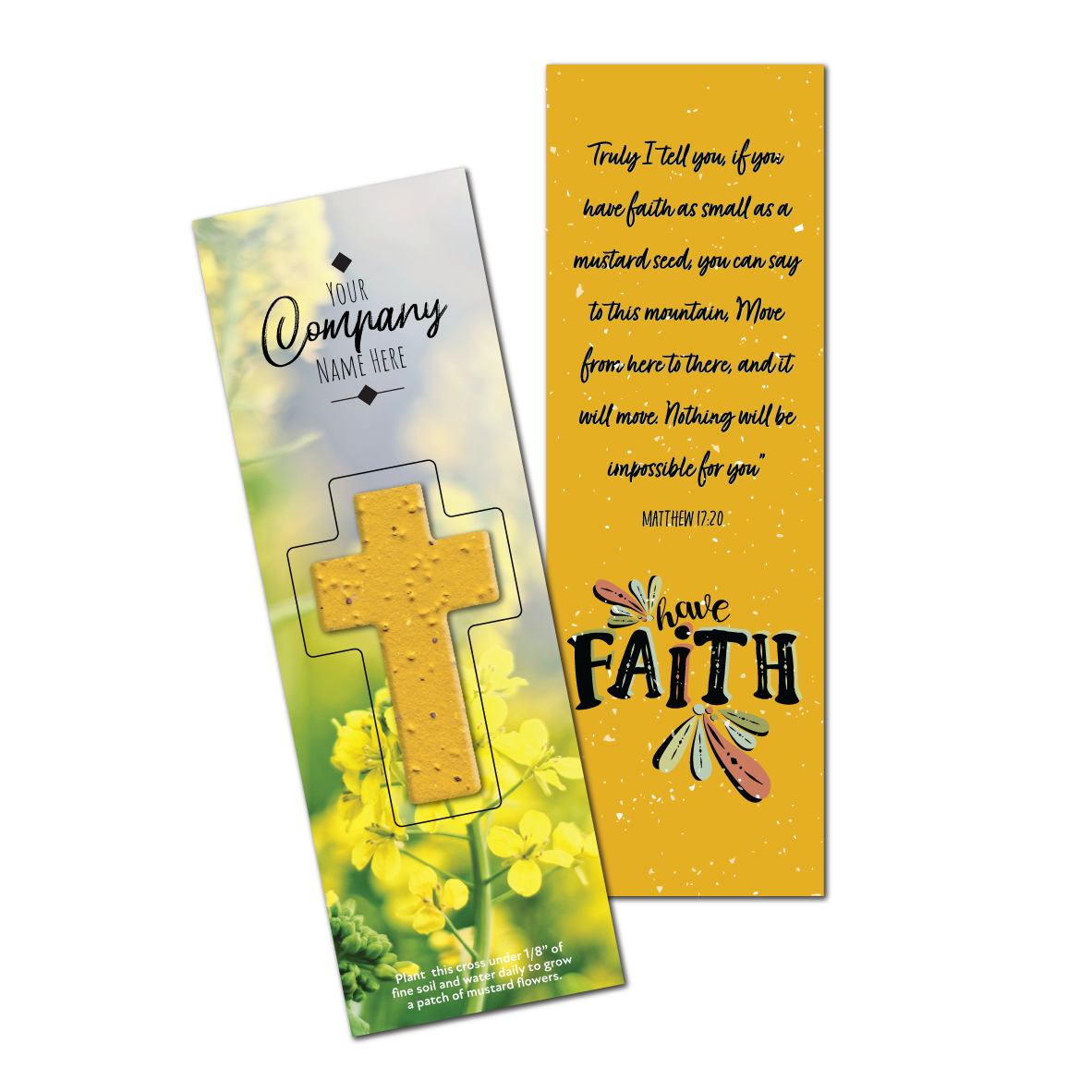Mustard Cross Bookmark
Dimensions: 2″x 6″
Give a gift of encouragement with this Mustard Cross Bookmark. The beautiful 2″ x 6″ sized bookmark is printed in full color front, and back. One side features the scripture from Matthew 17:20, and the other side, a full color photo along with your companies logo. Each bookmark comes with a mustard seed embedded cross, that can be removed and planted to grow mustard greens.
A mustard seed plant is the same plant as a mustard greens plant (Brassica juncea). This versatile plant can be grown as a vegetable and eaten like other greens or, if allowed to flower and go to seed, mustard seeds can be harvested and used as a spice in cooking or ground into a popular condiment. Learning how to grow mustard seeds is easy and rewarding. How to Plant Mustard Seed Mustard seed plants are normally grown from seed but can be grown from purchased seedlings as well. When selecting mustard seeds for planting, any mustard plant grown for greens can also be grown for mustard seed. Plant the mustard seed about three weeks before your last frost date. Since you’ll be harvesting the mustard seed, there’s no need to use succession planting like you do with mustard greens. Plant your mustard seeds about 1 inch (2.5 cm.) apart. Once they sprout, thin the seedlings so that they are 6 inches (15 cm.) apart. Mustard plants grown for seed are planted further apart than plants grown for just leaves as the mustard plant will be getting much larger before it flowers. If you are planting purchased mustard seedlings, plant these 6 inches apart as well. How to Grow Mustard Seeds Once mustard seed plants start growing, they need little care. They enjoy cool weather and will bolt (flower) quickly in warmer weather. While this may seem like a great thing if you are looking to grow mustard seeds, it is not. Mustard plants that bolt due to warm weather will produce poor flowers and seeds. It’s best to keep them on their normal flowering cycle to be able to harvest the best mustard seeds. Mustard seed plants need 2 inches (5 cm.) of water a week. Normally, during cool weather, you should get enough rainfall to supply this, but if you don’t, you’ll need to do additional watering. Mustard seed plants don’t need fertilizer if they have been planted in well amended garden soil, but if you’re unsure if your soil is nutrient rich, you can add a balanced fertilizer to the roots once the plants are 3 to 4 inches (8-10 cm.) tall. How to Harvest Mustard Seeds The mustard plants will eventually flower and go to seed. The flowers of mustard seed plant are generally yellow but some varieties have white flowers. As the mustard flower grows and matures, it will form pods. Watch for these pods to start to turn brown. Another sign that you are nearing harvest time will be that the leaves of the plant will start to yellow. Be careful not to leave the pods on the mustard seed plant for too long as they will burst open when fully ripe and the mustard seed harvest will be lost. The next step in harvesting mustard seeds is to remove the seeds from the pods. You can do this with your hands, or you can place the flower heads in a paper bag and allow them to finish maturing. The pods will open on their own in one to two weeks and a gentle shake of the bag will shake loose most of the mustard seeds. Mustard seeds can be used fresh, but like other herbs and spices, if you plan on storing them long term, they will need to be dried.
| Quantity | 100 | 250 | 500 | 1000 | 2500 | |
| MCB | 1.52 | 1.38 | 1.24 | 1.10 | 0.98 | |
| For Eco gift sleeve: | add $0.20 (C) | |||||
| All pricing (A) | ||||||
| Set-up $35 (G) per printed side |


